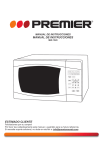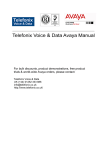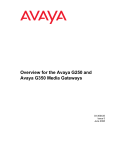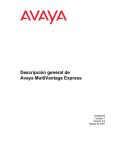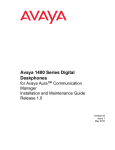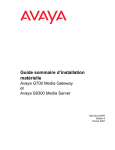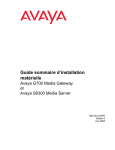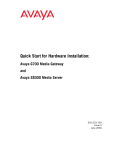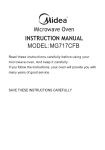Download Elba MM717 Instruction manual
Transcript
Microwave Oven INSTRUCTION MANUAL MODEL:MM717 Read these instructions carefully before using your microwave oven, and keep it carefully. If you follow the instructions, your oven will provide you with many years of good service. SAVE THESE INSTRUCTIONS CAREFULLY PRECAUTIONS TO AVOID POSSIBLE EXPOSURE TO EXCESSIVE MICROWAVE ENERGY (a) Do not attempt to operate this oven with the door open since this can result in harmful exposure to microwave energy. It is important not to break or tamper with the safety interlocks. (b) Do not place any object between the oven front face and the door or allow soil or cleaner residue to accumulate on sealing surfaces. (c) WARNING: If the door or door seals are damaged, the oven must not be operated until it has been repaired by a competent person. Specifications Model: MM717 Rated Voltage: 230V~ 50Hz 2450MHz Rated Input Power: 1150W Rated Output Power: 700W Oven Capacity: 17L 245mm Turntable Diameter: Packaging Dimensions(LxWxH): 461x365x280mm Weight(Net): 12.2 kg 2 IMPORTANT SAFETY INSTRUCTIONS WARNING To reduce the risk of fire, electric shock, injury to persons or exposure to excessive microwave oven energy when using your appliance, follow basic precautions, including the following: 1. Warning: Liquids and other foods must not be heated in sealed containers since they are liable to explode. 2. Warning: It is hazardous for anyone other than a competent person to remove a cover which gives protection against exposure to microwave energy. 3. Warning: Only allow children to use the oven without supervision when adequate instructions have been given so that the child is able to use the oven in a safe way and understand the hazards of improper use. 5. Only use utensils suitable for use in microwave ovens. 6. The oven should be cleaned regularly and any food deposits should be removed. 7. Read and follow the specific: "PRECAUTIONS TO AVOID POSSIBLE EXPOSURE TO EXCESSIVE MICROWAVE ENERGY". 8. When heating food in plastic or paper containers, keep an eye on the oven due to the possibility of ignition. 9. If smoke is observed, switch off or unplug the appliance and keep the door closed in order to stifle any flames. 10. Do not overcook food. 11. Do not use the oven cavity for storage purposes. Do not store combustible items, such as bread, cookies, etc. inside the oven. 12. Remove wire twist-ties and metal handles from paper or plastic containers/bags before placing them in the oven. 13. Install or locate this oven only in accordance with the installation instructions provided. 14. Eggs in the shell and whole hard-boiled eggs should not be heated in microwave ovens since they may explode, even after microwave heating has ended. 15. Use this appliance only for its intended uses as described in manual. Do not use corrosive chemicals or vapors in this appliance. This oven is especially designed to heat. It is not designed for industrial or laboratory use. 16. If the supply cord is damaged, it must be replaced by the manufacture, its service agent or similarly qualified persons in order to avoid a hazard. 17. Do not store or use this appliance outdoors. 18. Do not use this oven near water, in a wet basement or near a swimming pool. 19. The temperature of accessible surfaces may be high when the appliance is operating. Keep cord away from heated surface, and do not cover any events on the oven. 20. Do not let cord hang over edge of table or counter. 21. Failure to maintain the oven in a clean condition could lead to deterioration of the surface that could adversely affect the life of the appliance and possibly result in a hazardous situation. 22. The contents of feeding bottles and baby food jars shall be stirred or shaken and the temperature checked before consumption, in order to avoid burns. 23. Microwave heating of beverages can result in delayed eruptive boiling, therefore take care when handling the container. 3 To Reduce the Risk of Injury to Persons Grounding Installation DANGER Electric Shock Hazard Touching some of the internal components can cause serious personal injury or death. Do not disassemble this appliance. WARNING Electric Shock Hazard Improper use of the grounding can result in electric shock. Do not plug into an outlet until appliance is properly installed and grounded. CLEANING Be sure to disconnect the oven from the power supply. 1. Clean the inside of the oven after using with a slightly damp cloth. 2. Clean the accessories in the usual way in soapy water. 3. The door frame and seal and neighboring parts must be cleaned carefully with a damp cloth when they are dirty. This appliance must be grounded. In the event of an electrical short circuit, grounding reduces the risk of electric shock by providing an escape wire for the electric current. This appliance is equipped with a cord having a grounding wire with a grounding plug. The plug must be plugged into an outlet that is properly installed and grounded. Consult a qualified electrician or serviceman if the grounding instructions are not completely understood or if doubt exists as to whether the appliance is properly grounded. If it is necessary to use an extension cord, use only a 3-wire extension cord that has a 2-pronged plug with a grounding slot & 2 grounding plates. A 2-slot receptacle, with a grounding prong or grounding terminal(s), will accept the plug of the appliance. 1. A short power-supply cord is provided to reduce the risks resulting from becoming entangled in or tripping over a longer cord. 2. If a long cord set or extension cord is used: 1)The marked electrical rating of the cord set or extension cord should be at least as great as the electrical rating of the appliance. 2)The extension cord must be a groundingtype 3-wire cord. 3)The long cord should be arranged so that it will not drape over the counter top or tabletop where it can be pulled on by children or tripped over unintentionally. 4 CAUTION UTENSILS Personal Injury Hazard See the instructions on "Materials you can use in microwave oven or to be avoided in microwave oven." There may be certain non-metalic utensils that are not safe to use for microwaving. If in doubt, you can test the utensil in question following the procedure below. It is hazardous for anyone other than a competent person to carry out any service or repair operation that involves the removal of a cover which gives protection against exposure to microwave energy. Utensil Test: 1. Fill a microwave-safe container with 1 cup of cold water (250ml) along with the utensil in question. 2. Cook on maximum power for 1 minute. 3. Carefully feel the utensil. If the empty utensil is warm, do not use it for microwave cooking. 4. Do not exceed 1 minute cooking time. Materials you can use in microwave oven Utensils Remarks Aluminum foil Shielding only. Small smooth pieces can be used to cover thin parts of meat or poultry to prevent overcooking. Arcing can occur if foil is too close to oven walls. The foil should be at least 2.5cm away from oven walls. Follow manufacturer’s instructions. The bottom of browning dish must be at least 5mm above the turntable. Incorrect usage may cause the turntable to break. Microwave-safe only. Follow manufacturer's instructions. Do not use cracked or chipped dishes. Always remove lid. Use only to heat food until just warm. Most glass jars are not heat resistant and may break. Heat-resistant oven glassware only. Make sure there is no metalic trim. Do not use cracked or chipped dishes. Follow manufacturer’s instructions. Do not close with metal tie. Make slits to allow steam to escape. Use for short–term cooking/warming only. Do not leave oven unattended while cooking. Use to cover food for reheating and absorbing fat. Use with supervision for a short-term cooking only. Use as a cover to prevent splattering or a wrap for steaming. Browning dish Dinnerware Glass jars Glassware Oven cooking bags Paper plates and cups Paper towels Parchment paper Plastic Plastic wrap Thermometers Wax paper Microwave-safe only. Follow the manufacturer’s instructions. Should be labeled "Microwave Safe". Some plastic containers soften, as the food inside gets hot. "Boiling bags" and tightly closed plastic bags should be slit, pierced or vented as directed by package. Microwave-safe only. Use to cover food during cooking to retain moisture. Do not allow plastic wrap to touch food. Microwave-safe only (meat and candy thermometers). Use as a cover to prevent splattering and retain moisture. 5 Materials to be avoided in microwave oven Utensils Aluminum tray Food carton with metal handle Metal or metaltrimmed utensils Metal twist ties Paper bags Plastic foam Wood Remarks May cause arcing. Transfer food into microwave-safe dish. May cause arcing. Transfer food into microwave-safe dish. Metal shields the food from microwave energy. Metal trim may cause arcing. May cause arcing and could cause a fire in the oven. May cause a fire in the oven. Plastic foam may melt or contaminate the liquid inside when exposed to high temperature. Wood will dry out when used in the microwave oven and may split or crack. SETTING UP YOUR OVEN Names of Oven Parts and Accessories Remove the oven and all materials from the carton and oven cavity. Your oven comes with the following accessories: Glass tray 1 Turntable ring assembly 1 Instruction Manual 1 F E C D A B A) Control panel B) Turntable shaft C) Turntable ring assembly D) Glass tray E) Observation window F) Door assembly G) Safety interlock system G Shuts off oven power if the door is opened during operation. 6 Turntable Installation a. Never place the glass tray upside down. The glass tray should never be restricted. b. Both glass tray and turntable ring assembly must always be used during cooking. c. All food and containers of food are always placed on the glass tray for cooking. d. If glass tray or turntable ring assembly cracks or breaks, contact your nearest authorized service center. Hub (underside) Glass tray Turntable shaft Turntable ring assembly Countertop Installation Remove all packing material and accessories. Examine the oven for any damage such as dents or broken door. Do not install if oven is damaged. Cabinet: Remove any protective film found on the microwave oven cabinet surface. Do not remove the light brown Mica cover that is attached to the oven cavity to protect the magnetron. Installation (3) Blocking the intake and/or outlet openings can damage the oven. (4) Place the oven as far away from radios and TV as possible. Operation of microwave oven may cause interference to your radio or TV reception. 2. Plug your oven into a standard household outlet. Be sure the voltage and the frequency is the same as the voltage and the frequency on the rating label. 1. Select a level surface that provide enough open space for the intake and/or outlet vents. 30cm 7.5cm OPEN 7.5cm WARNING: Do not install oven over a range cooktop or other heat-producing appliance. If installed near or over a heat source, the oven could be damaged and the warranty would be void. A minimum clearance of 7.5cm is required between the oven and any adjacent walls. One side must be open. (1) Leave a minimum clearance of 30cm above the oven. (2) Do not remove the legs from the bottom of the oven. 7 OPERATION Control Panel and Features Operation Instructions 1.To set cooking power by turning the power knob to desired level. 2.To set the time of cooking by turning the timer knob to desired time per your food cooking guide. 3.The microwave oven will automatically start cooking after power level and time are set. 4.After the cooking time is up, the unit will "Dong" to stop. 5.If the unit is not in use, always set time to "0". Power Timer Function/Power Output Low 17% power Med. Low (Defrost) 33% power Application Soften ice cream Soup stew, soften butter or defrost Med. 55% power Stew, fish Med. High 77% power Rice, fish, chicken, ground meat High 100% power Reheat, milk, boil water, vegetables, beverage Notice: When removing food from the oven, please ensure that the oven power is switched off by turning the timer switch to 0 (zero). Failure to do so, and operating the microwave oven without food in it, can result in overheating and damage to the magnetron. 8 Maintenance Troubleshooting 9









